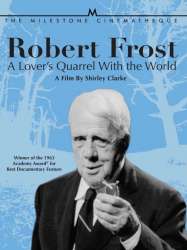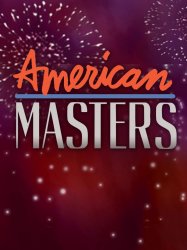Keats and His Nightingale: A Blind Date is a american film of genre Documentary released in USA on 1 january 1985
Keats and His Nightingale: A Blind Date (1985)

If you like this film, let us know!
- Infos
- Casting
- Technical infos
- Photos
- Videos
- Film quotes
- Characters
- Music
- Awards
Keats and His Nightingale: A Blind Date is a 1985 American short documentary film directed by Jim Wolpaw. It was nominated for an Academy Award for Best Documentary Short.
^ "NY Times: Keats and His Nightingale: A Blind Date". NY Times. Retrieved 2008-12-03.
Comments
Leave comment :
Suggestions of similar film to Keats and His Nightingale: A Blind Date
There are 8969 with the same cinematographic genres, 3169 films with the same themes (including 105 films with the same 2 themes than Keats and His Nightingale: A Blind Date), to have finally 70 suggestions of similar films.If you liked Keats and His Nightingale: A Blind Date, you will probably like those similar films :
 , 2h20
, 2h20Origin USA
Genres Documentary
Themes Films about writers, Films about slavery, Films about racism, Documentary films about racism, Documentary films about law, Documentary films about historical events, Documentaire sur une personnalité
Actors Diahann Carroll

Svetlana About Svetlana (2008)
Genres Documentary
Themes Films about writers, Documentaire sur une personnalité
Rating56%






Pharos of Chaos (1983)
, 1h59Genres Documentary
Themes Films about writers, Films about television, Documentary films about business, Documentary films about the film industry, Documentaire sur une personnalité
Actors Sterling Hayden, Burkhard Driest, Hanns Zischler, Charles Brauer
Rating70%





 , 51minutes
, 51minutesDirected by Shirley Clarke
Origin USA
Genres Documentary
Themes Films about writers, Documentaire sur une personnalité
Rating64%





Le documentaire parcourt les dernières années du poète Robert Frost (1874-1963). On le voit notamment recevoir une récompense des mains du président John Kennedy.
 , 1h
, 1hDirected by Raphaël Millet
Origin France
Genres Documentary
Themes Films about writers, Films about journalists, Documentary films about business, Documentary films about the visual arts, Documentary films about the film industry, Documentaire sur une personnalité, Political films
Actors Pierre Schoendoerffer, Costa-Gavras, Raoul Coutard, Jacques Perrin
Pierre Schoendoerffer revisits his life and career, with a strong focus on the impact that his experience as a war cinematographer for the French army during the Indochina War had on him, as well as a war reporter during the Vietnam War when he filmed his 1967 Academy Award winning documentary The Anderson Platoon named after the leader of the platoon - Lieutenant Joseph B. Anderson - with which Schoendoerffer and his crew were embedded.

Harto The Borges (2000)
, 1h20Directed by Eduardo Montes-Bradley
Genres Documentary
Themes Films about writers, Documentaire sur une personnalité
Actors Jorge Luis Borges, Osvaldo Bayer
Rating60%





Montes-Bradley approaches Jorge Luis Borges on film. The portrait of Borges emerges as a counterpoint to the interviewees, some of which evoke scandal and most of which cut through stereotypes and presuppositions surrounding this key figure. The title of the film is a reference to a quote from the poem “Borges and I”, slightly modify to pay a tribute to the writer´s billings. The strategy employed by Montes-Bradley when it comes to Borges, a writer of whom almost everything has been said, consists on giving the word to the writer himself and to a select group of intellectuals who dwell on the margins of the Argentine cultural aparatik. Montes-Bradley, however, does not exhibit Borges like a painting to be admired but rather as counterpoint to the observations of others. We are neither the hapless witnesses of another saccharine celebration of Jorge Luis Borges, nor are we forced to endure another fashionable defrocking of an idol. The Borges that emerges from the interaction of the testimonies in this documentary surges from the heat of the debate, from the strong opinions, some certainly scandalous, most politically incorrect.
 , 1h51
, 1h51Origin USA
Genres Documentary
Themes Films about writers, Films about journalists, Documentaire sur une personnalité
Rating75%






Living on the Edge (2005)
, 1h16Directed by Rodrigue Jean
Origin Canada
Genres Documentary
Themes Films about writers, Documentaire sur une personnalité
A child of the Beat Generation, Gérald Leblanc conjoined urban-ness and American-ness, wandering and belonging, far beyond the boundaries of taboo. In so doing, he helped propel Acadia into the modern era.

The Ten-Year Lunch (1987)
, 56minutesDirected by Aviva Slesin
Origin USA
Genres Documentary
Themes Films about writers, Documentary films about historical events, Documentaire sur une personnalité, Documentary films about cities
Actors Helen Hayes, Heywood Hale Broun, Ruth Gordon, Margalo Gillmore, Roberta Maxwell, Marshall Efron
Rating65%





Le film retrace l'histoire de l'Algonquin Round Table, un groupe d'écrivains et d'acteurs à qui se réunissaient à l'Hôtel Algonquin à New York dans les années 1920, comprenant des personnalités telles que Dorothy Parker, Robert Benchley, George S. Kaufman, Edna Ferber, Marc Connelly, Harold Ross et Harpo Marx.
 Connection
Connection
